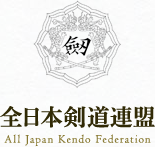- 全日本剣道連盟トップ
- 剣筆 特別寄稿 剣道との再会
剣筆 特別寄稿 剣道との再会
KENPITSU Special contribution Rediscovering kendo
- 平成26年度「少年剣...
- 剣筆 特別寄稿 剣道との再会
- 夏季休暇のお知らせ
剣道との再会/Rediscovering kendo
駐日英国大使 ティム・ヒッチンズ/British Ambassador to Japan Tim Hitchens

私たちは、恐らく、その行う仕事によるよりもスポーツによって定義される方が好ましいように思う。私は、パリ、東京、パキスタン、アフガニスタンと勤務地を変えつつ、英国の外交官として30年以上を過ごしてきた。私は、英国、オーストラリアとシンガポールで育ち、十代の生活の多くを日本で過ごした。かくして、世界の人々がその選択するスポーツを通して自らを表現する多くの異なった方法を見て来た。
We are perhaps better defined by the sports we play than the work we do. I have spent over thirty years working as a British diplomat, posted to places as diverse as Paris, Tokyo, Pakistan and Afghanistan. I was brought up in Britain, Australia and Singapore, and spent much of my teenage life in Japan. So I have seen many different ways in which the people of the world express themselves through the sports they choose to play.
フランスにおける象徴的なスポーツは、自転車―特に、「ツール・ド・フランス」―である。これは、北部の寒い平原から圧倒するように険しく美しいアルプス街道を上り、プロヴァンスの熱気と芳香の地に至る、フランスの地理的驚異をなぞる偉大なレースである。フランスの文化全体がレースの中に現れる。そして、今年のレースの出発点が英国のヨークシャーである。この偉大なフランスの伝統が国際化されていることの、素晴らしい象徴である。
In France, the iconic sport is cycling ? in particular the tour de France. This is a great race which traces the geographical wonder of France, from the cold plains of the north, up the shattering and beautiful Alpine roads, down to the heat and fragrance of Provence. The whole culture of France is present in the race; and the fact that the race is this year starting in Yorkshire, England, is an excellent symbol of the internationalisation of this great French tradition.
アフガニスタンにおいては、スポーツは、より野性的で、その国の部族の歴史に近接したものとなる。私は、恐らく今日のポロ(注:4人一組の両チームで行うホッケーに似た馬上球戯)の原点であると思われる、荒々しく魅惑的な「ホースバック・ゲーム(注:馬、山羊等の動物に乗って、速さを競う競技)」を見てきた。すなわち、その競技では、騎手が互いに乗っている動物の鼻先を競り合い、決勝線を駆け抜けるのである。
In Afghanistan, sports are wilder, and nearer the tribal history of the country. I have seen the savage and bewitching horseback game, probably the origins of what is now polo, in which horseback participants compete with each other to snatch an animal’s head and ride it over the winning line.
パキスタンでは英国から輸出されたクリケットが国技であり、かつての植民地が、今や国際試合を制するに至っている。クリケットは英国紳士によって考案され、数日間続く、ひどく複雑な規則の競技であったが、オーストラリア、アフリカおよび南アジアに伝播され、広がるうちに進化してきたものである。
In Pakistan, the national game is cricket, that export from Britain in which former colonies now tend to rule the international game. Cricket is a game designed by English gentlemen, lasting several days and with fiercely complicated rules, but which has evolved as it has been transplanted into Australasia, Africa and South Asia.
かくして、日本に住み、働く英国人として、私は、専門的な物事と同様に娯楽にも興味がある。私は自分自身に、英国のバックグランドから生み出されたものを感じる。英国人が自らを表現する英国の言い回しに、「英国人は、ゲームを人生としてではなく、人生をゲームとして扱う」というものがある。言い換えれば、私たち英国人は、仕事を余り深刻に捉えようとせず、スポーツを非常に真剣に、多分、過度に真剣に捉えようとする。
So as a British person coming to live and work in Japan, I am as interested in pastimes as I am in professional subjects. I recognise in myself a product of a British background. There is a British phrase which describes us this way: “the British treat life as a game, but they treat games as their life.” In other words, we try not to take work too seriously; but we take our sports very seriously ? perhaps too seriously.
私はこれまで、いつもスポーツを楽しんで来た。テニス、スクォッシュ、ラグビー、ゴルフ、サイクリング、クリケット、ホッケーなどである。大使である今、思うようにスポーツに時間を割くことはできないが、私の最も楽しい経験のある部分はスポーツに関連している。すなわち、富士山の見えるゴルフコースでの素晴らしい日曜日の朝、南相馬(実のところ、南相馬野球場であったが)での東北チームとのクリケット、秩父宮国立ラグビー場でのラグビー、緑樹に囲まれた箱根での早朝テニス、長野県の野尻湖での水泳などである。
I have always enjoyed sports. Tennis, squash, rugby, golf, cycling, cricket, hockey. As an Ambassador I have less time for sports than I would like, but some of my most enjoyable experiences have been linked to sports. Wonderful Sunday mornings on golf courses with a view of Mount Fuji. Playing cricket against a Tohoku team in Minamisoma (actually, at the Minamisoma baseball ground). Playing rugby at the Chichiby National Rugby stadium. Playing early morning tennis in Hakone, surrounded by greenery. Swimming in Lake Nojiri in Nagano Ken.
これらのそれぞれは、刺激的で楽しいものであった。しかし、この稿では、私は、スポーツ以上の何かをもって私を魅了するものについて触れてみたいと考えた。すなわち、剣道である。そして、それは、この素晴らしい国との私の永続的な関係を表現する何かである。
Each of these has been exhilarating and enjoyable. But in this article I wanted to explain my fascination with something which is more than a sport ? kendo. And something which expresses my enduring connection with this wonderful country.
森 喜朗元総理は、誰もが知るように、ラグビーの熱烈な愛好家だ。私は運良く、日本が香港を破りアジアカップを得て2015年の英国でのラグビーワールドカップの出場権を得た、5月の国立競技場に彼と居合わせた。ラグビーワールドカップは、オリンピックとサッカーワールドカップの後の第3番目に大きな国際スポーツ行事である。英国と日本は、英国での2012年のオリンピックの経験が2020年の東京でのオリンピックとパラリンピックの実施に役立つよう、特に緊密に連携し合っている。そして同時に、2019年のラグビーワールドカップを主催予定の東京と我々は、2015年の英国でのラグビーワールドカップの経験を共有すべく緊密に連携し合っているところである。日本のファンにとって、その年に世界の最高のラグビー選手を見ることは、素晴らしい経験となることと思う。
Former Prime Minister Mori is, as everyone knows, passionate about rugby. I was lucky enough to be with him at the National Stadium in May as Japan beat Hong Kong to win the Asian cup and qualify for the Rugby World Cup in England in 2015. The Rugby World Cup is the third biggest international sporting event after the Olympics and the Football World Cup. Britain and Japan are working particularly closely together so that our experience of London 2012 can be shared with those organising the Olympics and Paralympics in Tokyo in 2020; and at the same time we are working closely to share our experience of England Rugby 2015 with Tokyo, which is hosting the Rugby World Cup in 2019. It will be a wonderful experience for Japanese fans to see the greatest rugby players in the world in Tokyo that year.
森元総理は私に、人生を、「サッカーボールよりもむしろラグビーボールに似ている」と語られたことがある。サッカーボールは、軌道を見て、ボールのバウンドを予想することが出来る。ラグビーボールは、その独特の形状から、非常に予測し難い方向にバウンドする。森氏自身の人生が、幾分かの予測出来ないバウンドを含んだものであった。そして、私の人生についても全く同様の経験がある。
Mr Mori described life to me as “more like a rugby ball than a football”. With a football, you see the trajectory and can predict how the ball will bounce. With a rugby ball, with its distinctive shape, it can bounce at very unpredictable angles. Mr Mori’s own life has involved some unpredicted bounces. And mine has been exactly the same experience.
私が学生時代で日本にいたとき、私の母は労働省で英語を教えていた。その優秀で若い生徒たちの中に濵田直樹という青年がいた。彼は、母と私に親切にしてくれ、後に私が日本に独りで滞在していたとき、彼と私は礼文島、利尻島まで素晴らしい1週間の長期北海道旅行を楽しんだ。彼は剣道に熱心で、東京のとある学校の早朝稽古に私を連れて行ってくれた。その後、私が若き外交官として日本に着任したときも、彼は再び私に大変、親切に接してくれた。
When I was in Japan as a student, my mother taught English at the Ministry of Labour. Among her bright young students was a young man called Hamada Naoki. He was kind to my mother and me; and when, later, I was in Japan alone, he and I enjoyed a wonderful week’s long trip to Hokkaido, travelling as far north as Rebun and Risshiri Islands. He was passionate about kendo, and took me to an early morning kendo lesson he was holding at a local Tokyo school. When I was appointed a young diplomat, he was again very kind to me.
しかしながら、良くあることだが、その後、私たちの人生は異なる方向にバウンドした。連絡が途絶え、私は、しばしば濵田さんのことを思い出したが、彼がどうしているかを知るすべもなかった。
But as often happens, our lives bounced in different directions. We lost touch. And though I often thought of Hamada san, I had no way of knowing what had happened to him.
その後、英国大使として2012年12月に日本に赴任し、諸大臣を表敬訪問し始めた頃、私は幸運にも田村憲久厚生労働大臣にお目にかかることができた。表敬の最後に、田村大臣の側近の方に濵田直樹という職員がいるかと尋ねた。驚いたことに、彼は同じ省内で勤務しているというのだ。運命のラグビーボールは、私の方向にバウンドして、真っすぐに私の手中に飛び込んで来たのだった。
When I arrived in Japan as British Ambassador in December 2012, I began my early series of calls on senior cabinet ministers. I was lucky enough to call on Minister Tamura, Minister of Health, Labour and Welfare. At the end of the call I asked one of Minister Tamura’s aides if he knew a former Ministry official called Hamada Naoki. To my amazement, he said he was working in the floor above. The rugby ball of fate had bounced back in my direction, straight into my hands!
濵田さんと私はすぐに連絡を復活した。彼は年齢が60歳近くになり、公務員生活を間もなく終えようとしていたことがわかった。彼は、当面、何をなすべきか迷っていた。彼は、私が剣道を学ぶことに興味が無いかと尋ねた。
Hamada san and I soon made contact again. It turned out that he was on the point of reaching the age of sixty, and leaving public service. He had been wondering for some time what he should do. Would I, he asked, be interested in learning kendo?
これは、素晴らしい驚きだった。私は30年以上前に、彼と早朝、学校で見たことのある剣道を思い出した。私は、剣道が単なるスポーツ以上のものであること、そして、それが日本と日本精神を洞察させるものであろうこと―それは、外交官としての仕事の中心となるものである―が分かっていた。私は、それが時間のかかるものだということも、そして、何か新しいことを50歳で始めようとするのだから上級者になることは期待できないということも分かっていた。私は、いつも学習者であろうとしていた。しかしながら、本を読み理解すればするほど、これ自体が、まさに大事であると分かってきた。すなわち、剣道は修得すべき何かではなく、自分がいつも進み行く途上にある何かであるということだ。
This was a wonderful surprise. I remembered the kendo I had seen at the school more than 30 years before, early in the morning with him. I knew that this was more than a sport, and that it would allow me to gain some insight into Japan and the Japanese spirit ? something which is absolutely central to a diplomat’s job. I knew it would involve a commitment of time. I also recognised that, since I was starting something brand new at the age of 50, I could not expect to reach the upper ranks. I was always going to be a learner. But the more I read and understood, the more I realised that this itself was exactly the point; kendo is not something you master, but something you are always on the road towards.
私は、始めたときから1週間に1回しか稽古ができないできている。ほとんどの場合、毎週土曜日の朝、大使公邸のボールルームで、優雅な絨毯を巻き上げて床板をむき出しにし、竹刀や木剣がシャンデリアに当たらないように細心の注意を払う。天気が良いときは、濵田先生と庭に出て広い芝生の上で稽古する。刈られたばかりの草の足の裏での感触は素晴らしい。私は、近隣がどう思うかについての気遣いから来る、大きな気合いを掛けることに対する気後れを克服する必要を感じている。
I have since those early days practised just about every week. For the most part, I have done so in the ballroom of the Ambassador's Residence every Saturday morning, rolling up the elegant carpet to expose the wooden floor below, and taking great care not to hit the chandelier with my shinai or bokken. If the weather is very good, Hamada sensei and I go out into the garden and undertake keiko on the wide lawn. The feel of freshly cut grass under your feet is wonderful. I need to overcome my reticence at shouting loudly outside, fearing what the neighbours may think.
さらに、私には、大変、親切に受け入れていただいている二組の友人たちがいる。巣鴨の三菱道場と中野区の小澤 博先生の道場の会員の皆さんである。これら先生方と友人達のお陰で、一級と先般、初段にどうにか合格することができた。審査において背の高い、銀髪の外国人と手合わせることになり、鮮やかでしっかりした面を打つことが難しかったであろう若い学生たちに感謝しなければなるまい。
And I have also been very graciously welcomed by two sets of friends ? the members of the Mitsubishi dojo in Sugamo and the dojo of Ozawa Hiroshi Sensei. With the help of my friends and teachers, I have managed to pass both Ikkyu and Shodan. I should express my gratitude to the young students who found themselves matched against a tall white haired foreigner during the examination day, and who found it difficult to reach up to a clean and strong shomen strike during our bouts.
かくして、私がこれまで剣道修練から学んだことは、次のとおりである。
So what have I learned from my kendo training so far/
第一に、何か新しく、難しいものを始めることはとても良い、しかも、年をとっているほど良いことである。我々は、年齢を重ね、責任が増えてくると、効果や経験が無いのではないかという恐れから、確信の持てないものを敬遠しがちである。50歳代で剣道を学ぶことは、大きな謙遜を学ばせてくれる。仕事で誰かがお世辞を言ってくれることがあっても、いつも私は、「道場でまだ学ぶべきことがまだいかに多くあるかを知るべきだ」と自分に言い聞かせている。
First, that it is very good to try something new and difficult, and the older you are the better it is. As we get more senior and responsible, we can become reluctant to do things we are not confident in, for fear of looking ineffective or inexperienced. Learning Kendo in your fifties teaches great humility. Whenever anyone flatters me for my diplomacy at work, I think “but you should see quite how much I still have to learn at the dojo.”
第二に、剣道は日本人の魂につながる窓である。神棚に対する畏敬は、日本における権威に対する畏敬として、剣道の中心となるものである。イスラム教は、文字通り、アラビア語で「恭順」を意味するが、剣道は同様に、我々に我々以上の偉大な何かに対して従順となることを教えてくれる。
Second, kendo is a window into the Japanese soul. The reverence showed to the kamidana is central to kendo, as is the reverence showed to authority in Japan. The great religion of Islam means, literally, “submission”, and in the same way kendo teaches us to submit to something greater than ourselves.
第三に、稽古のときに気合いを出すことが、私にはとても難しく、かつとても大切だと感じている。私は生来、どちらかかと言えば内気でしかも英国人である。そのため、大きな声をあげることは避けて来たことのひとつである。それ故、声をあげ、私の中にある何か非常に深い、野生的なものからの表現を求められることは、容易ではなかった。私は、なお、私の原始的な部分を剣道精神の繊細さに結びつけることを何とかして学ばなければならない。
Third, I have found it very difficult, but very important, to shout during a bout. I have been naturally rather reserved and British; shouting is something I have avoided. So the requirement to raise my voice, and express something quite deep and animal within me, hasn’t come easily. I still have some way to go to learn to connect that primitive part of myself with the sophistication of the kendo spirit.
そして最後に、私は、自分を打突した相手に対する感謝の哲学を本当に楽しんでいる。なぜなら、相手は自分の試みようとした手段の弱点を明らかにすることを助けてくれたからだ。我々は、しばしば、批判され、自分の弱点を明らかにされることに対して防御的になるが、私は、批判を歓迎し、受け入れる度量を持つということが大変役に立つと分かった。大使としての私は批判をものともしないようであるべきと、人々が考えていることを感じる。しかしながら、より良い大使であるべきために必要なものは、まさに、私がさらに学ぶべきものを感じさせる建設的な批判である。
And finally, I have really enjoyed a philosophy in which you thank your adversary when he beats you, because he has helpfully exposed a weakness in your approach which you can now address. We are often defensive if we are criticised or our weakness is exposed; I have found it very helpful to have to welcome and encourage criticism. As an Ambassador I often find people think I must be above criticism; yet what I need, to be an even better Ambassador, is precisely that constructive criticism, which shows me where I have more to learn.
既に述べたとおり、私にはまだ歩むべき長い道のりがある。前進よりむしろ幾分か後退していると感じる週もある。私の先生は、剣道の稽古をしているときは自分自身が崖っぷちに立っていると想像するように、そして必ず体を前に出るか横にさばいて、決して後退することの無いようにと指導する。これは大変、賢明な哲学のように思われる。
As I say, I still have a very long way to go. There are weeks when I feel I have made more steps backwards than forwards. My teacher tells me that, when I am in a kendo bout, I should imagine myself just at a precipice behind me, and that whatever I do I must move forward, or sidewards, but never backwards. That seems like a very wise philosophy.
そして、これはまた、日本が自らを振り返る良い方法のようにも思われる。すなわち、すべって後退したり、萎縮すること無く、常に前進して、自信を持って、失敗から学ぶ―そして、年齢がいくつであろうとも、学びかつ修得することを開始できると自信を持つことを。
And it also seems a good way for Japan to see herself. Not slipping backwards, or shrinking, but always moving forward, confident, learning from mistakes ? and feeling confident that, whatever one’s age, one can learn and begin to master.
* この記事は、月刊「剣窓」2014年8月号の記事を再掲載しています。















